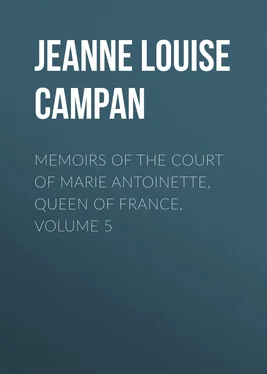Jeanne Louise Henriette Campan - Memoirs of the Court of Marie Antoinette, Queen of France, Volume 5
Здесь есть возможность читать онлайн «Jeanne Louise Henriette Campan - Memoirs of the Court of Marie Antoinette, Queen of France, Volume 5» — ознакомительный отрывок электронной книги совершенно бесплатно, а после прочтения отрывка купить полную версию. В некоторых случаях можно слушать аудио, скачать через торрент в формате fb2 и присутствует краткое содержание. Жанр: Биографии и Мемуары, История, foreign_edu, foreign_antique, foreign_prose, на английском языке. Описание произведения, (предисловие) а так же отзывы посетителей доступны на портале библиотеки ЛибКат.
- Название:Memoirs of the Court of Marie Antoinette, Queen of France, Volume 5
- Автор:
- Жанр:
- Год:неизвестен
- ISBN:нет данных
- Рейтинг книги:3 / 5. Голосов: 1
-
Избранное:Добавить в избранное
- Отзывы:
-
Ваша оценка:
- 60
- 1
- 2
- 3
- 4
- 5
Memoirs of the Court of Marie Antoinette, Queen of France, Volume 5: краткое содержание, описание и аннотация
Предлагаем к чтению аннотацию, описание, краткое содержание или предисловие (зависит от того, что написал сам автор книги «Memoirs of the Court of Marie Antoinette, Queen of France, Volume 5»). Если вы не нашли необходимую информацию о книге — напишите в комментариях, мы постараемся отыскать её.
Memoirs of the Court of Marie Antoinette, Queen of France, Volume 5 — читать онлайн ознакомительный отрывок
Ниже представлен текст книги, разбитый по страницам. Система сохранения места последней прочитанной страницы, позволяет с удобством читать онлайн бесплатно книгу «Memoirs of the Court of Marie Antoinette, Queen of France, Volume 5», без необходимости каждый раз заново искать на чём Вы остановились. Поставьте закладку, и сможете в любой момент перейти на страницу, на которой закончили чтение.
Интервал:
Закладка:
Mme. Campan
Memoirs of the Court of Marie Antoinette, Queen of France, Volume 5 / Being the Historic Memoirs of Madam Campan, First Lady in Waiting to the Queen
BOOK 2
CHAPTER I
The ever-memorable oath of the States General, taken at the Tennis Court of Versailles, was followed by the royal sitting of the 23d of June. In this seance the King declared that the Orders must vote separately, and threatened, if further obstacles were met with, to himself act for the good of the people. The Queen looked on M. Necker's not accompanying the King as treachery or criminal cowardice: she said that he had converted a remedy into poison; that being in full popularity, his audacity, in openly disavowing the step taken by his sovereign, had emboldened the factious, and led away the whole Assembly; and that he was the more culpable inasmuch as he had the evening before given her his word to accompany the King. In vain did M. Necker endeavour to excuse himself by saying that his advice had not been followed.
Soon afterwards the insurrections of the 11th, 12th, and 14th of July—[The Bastille was taken on the 14th July, 1789.]—opened the disastrous drama with which France was threatened. The massacre of M. de Flesselles and M. de Launay drew bitter tears from the Queen, and the idea that the King had lost such devoted subjects wounded her to the heart.
The character of the movement was no longer merely that of a popular insurrection; cries of "Vive la Nation! Vive le Roi! Vive la Liberte!" threw the strongest light upon the views of the reformers. Still the people spoke of the King with affection, and appeared to think him favourable to the national desire for the reform of what were called abuses; but they imagined that he was restrained by the opinions and influence of the Comte d'Artois and the Queen; and those two august personages were therefore objects of hatred to the malcontents. The dangers incurred by the Comte d'Artois determined the King's first step with the States General. He attended their meeting on the morning of the 15th of July with his brothers, without pomp or escort; he spoke standing and uncovered, and pronounced these memorable words: "I trust myself to you; I only wish to be at one with my nation, and, counting on the affection and fidelity of my subjects, I have given orders to the troops to remove from Paris and Versailles." The King returned on foot from the chamber of the States General to his palace; the deputies crowded after him, and formed his escort, and that of the Princes who accompanied him. The rage of the populace was pointed against the Comte d'Artois, whose unfavourable opinion of the double representation was an odious crime in their eyes. They repeatedly cried out, "The King for ever, in spite of you and your opinions, Monseigneur!" One woman had the impudence to come up to the King and ask him whether what he had been doing was done sincerely, and whether he would not be forced to retract it.
The courtyards of the Chateau were thronged with an immense concourse of people; they demanded that the King and Queen, with their children, should make their appearance in the balcony. The Queen gave me the key of the inner doors, which led to the Dauphin's apartments, and desired me to go to the Duchesse de Polignac to tell her that she wanted her son, and had directed me to bring him myself into her room, where she waited to show him to the people. The Duchess said this order indicated that she was not to accompany the Prince. I did not answer; she squeezed my hand, saying, "Ah! Madame Campan, what a blow I receive!" She embraced the child and me with tears. She knew how much I loved and valued the goodness and the noble simplicity of her disposition. I endeavoured to reassure her by saying that I should bring back the Prince to her; but she persisted, and said she understood the order, and knew what it meant. She then retired to her private room, holding her handkerchief to her eyes. One of the under-governesses asked me whether she might go with the Dauphin; I told her the Queen had given no order to the contrary, and we hastened to her Majesty, who was waiting to lead the Prince to the balcony.
Having executed this sad commission, I went down into the courtyard, where I mingled with the crowd. I heard a thousand vociferations; it was easy to see, by the difference between the language and the dress of some persons among the mob, that they were in disguise. A woman, whose face was covered with a black lace veil, seized me by the arm with some violence, and said, calling me by my name, "I know you very well; tell your Queen not to meddle with government any longer; let her leave her husband and our good States General to effect the happiness of the people." At the same moment a man, dressed much in the style of a marketman, with his hat pulled down over his eyes, seized me by the other arm, and said, "Yes, yes; tell her over and over again that it will not be with these States as with the others, which produced no good to the people; that the nation is too enlightened in 1789 not to make something more of them; and that there will not now be seen a deputy of the 'Tiers Etat' making a speech with one knee on the ground; tell her this, do you hear?" I was struck with dread; the Queen then appeared in the balcony. "Ah!" said the woman in the veil, "the Duchess is not with her."—"No," replied the man, "but she is still at Versailles; she is working underground, molelike; but we shall know how to dig her out." The detestable pair moved away from me, and I reentered the palace, scarcely able to support myself. I thought it my duty to relate the dialogue of these two strangers to the Queen; she made me repeat the particulars to the King.
About four in the afternoon I went across the terrace to Madame Victoire's apartments; three men had stopped under the windows of the throne-chamber. "Here is that throne," said one of them aloud, "the vestiges of which will soon be sought for." He added a thousand invectives against their Majesties. I went in to the Princess, who was at work alone in her closet, behind a canvass blind, which prevented her from being seen by those without. The three men were still walking upon the terrace; I showed them to her, and told her what they had said. She rose to take a nearer view of them, and informed me that one of them was named Saint-Huruge; that he was sold to the Duc d'Orleans, and was furious against the Government, because he had been confined once under a 'lettre de cachet' as a bad character.
The King was not ignorant of these popular threats; he also knew the days on which money was scattered about Paris, and once or twice the Queen prevented my going there, saying there would certainly be a riot the next day, because she knew that a quantity of crown pieces had been distributed in the faubourgs.
[I have seen a six-franc crown piece, which certainly served to pay some wretch on the night of the 12th of July; the words "Midnight, 12th July, three pistols," were rather deeply engraven on it. They were, no doubt, a password for the first insurrection. —MADAME COMPAN]
On the evening of the 14th of July the King came to the Queen's apartments, where I was with her Majesty alone; he conversed with her respecting the scandalous report disseminated by the factious, that he had had the Chamber of the National Assembly undermined, in order to blow it up; but he added that it became him to treat such absurd assertions with contempt, as usual; I ventured to tell him that I had the evening before supped with M. Begouen, one of the deputies, who said that there were very respectable persons who thought that this horrible contrivance had been proposed without the King's knowledge. "Then," said his Majesty, "as the idea of such an atrocity was not revolting to so worthy a man as M. Begouen, I will order the chamber to be examined early to-morrow morning." In fact, it will be seen by the King's, speech to the National Assembly, on the 15th of July, that the suspicions excited obtained his attention. "I know," said he in the speech in question, "that unworthy insinuations have been made; I know there are those who have dared to assert that your persons are not safe; can it be necessary to give you assurances upon the subject of reports so culpable, denied beforehand by my known character?"
Читать дальшеИнтервал:
Закладка:
Похожие книги на «Memoirs of the Court of Marie Antoinette, Queen of France, Volume 5»
Представляем Вашему вниманию похожие книги на «Memoirs of the Court of Marie Antoinette, Queen of France, Volume 5» списком для выбора. Мы отобрали схожую по названию и смыслу литературу в надежде предоставить читателям больше вариантов отыскать новые, интересные, ещё непрочитанные произведения.
Обсуждение, отзывы о книге «Memoirs of the Court of Marie Antoinette, Queen of France, Volume 5» и просто собственные мнения читателей. Оставьте ваши комментарии, напишите, что Вы думаете о произведении, его смысле или главных героях. Укажите что конкретно понравилось, а что нет, и почему Вы так считаете.












